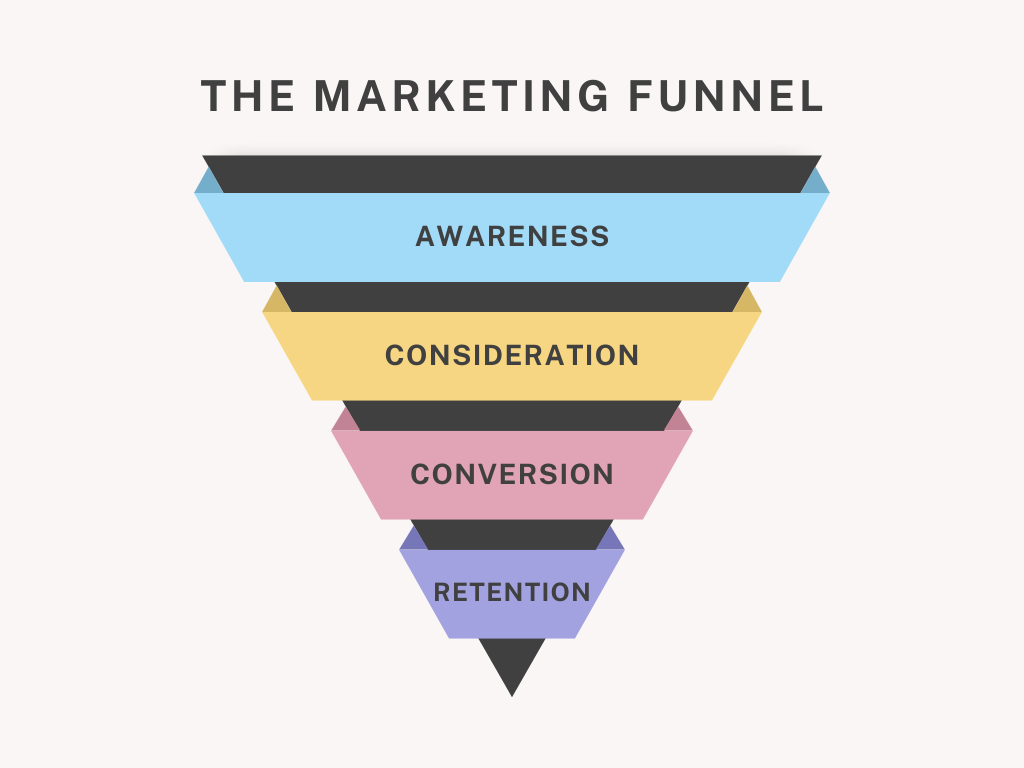Marketing can sometimes feel like throwing darts in the dark—hoping something will stick. But with the marketing funnel, you get a clear roadmap to guide your customers from learning about your business to becoming loyal advocates. In this post, we’ll break down the marketing funnel, explain its importance, and show how small businesses can use it to grow.
What Is the Marketing Funnel?
The marketing funnel is a model that represents the journey customers take from the moment they learn about your business to when they make a purchase—and beyond. Think of it as an upside-down cone, where potential customers move through different stages, gradually narrowing down to those who take action.
The Stages of the Marketing Funnel
1. Awareness: Getting on Their Radar
At the top of the funnel, your goal is to attract as many potential customers as possible. This is where people first hear about your business.
- Example: A Local Pool Cleaning Service
- They run Facebook ads targeting homeowners in warm climates and distribute flyers in neighborhoods with pools. This raises awareness among people who might need their services but haven’t thought about it yet.
2. Consideration: Building Trust and Interest
In the middle of the funnel, potential customers are weighing their options. They know about your business, but they’re evaluating whether to choose you.
- Example: A Small Accounting Firm
- They use their blog to answer common tax season questions and offer free downloadable checklists for tax preparation. These resources establish credibility and keep the firm top-of-mind when clients are ready to hire.
3. Conversion: Sealing the Deal
At the bottom of the funnel, it’s time to turn leads into paying customers. This stage focuses on closing the sale with clear calls-to-action and easy purchasing options.
- Example: A Mobile Pet Groomer
- They send personalized email follow-ups to leads who requested quotes, offering a “10% off your first grooming session” discount.
4. Retention: Keeping Customers Coming Back
The funnel doesn’t end after the sale. Loyal customers are the most valuable ones, as they’re more likely to buy again and recommend your business.
- Example: A Local Meal Prep Service
- They reward repeat customers with a points-based loyalty program and offer exclusive recipes via a monthly newsletter.
Why the Marketing Funnel Matters for Small Businesses
Understanding the marketing funnel is critical for small businesses. Here’s why:
- Focus Your Efforts: Knowing where customers are in their journey helps you target your marketing efforts more effectively.
- Improve Conversion Rates: By addressing customer needs at each stage, you’re more likely to turn leads into sales.
- Maximize ROI: Instead of guessing, you’ll spend your marketing budget on what works for your audience.
Take it from Why Your Small Business Needs Marketing to Succeed—having a structured approach like the marketing funnel ensures your efforts are focused and impactful.
How to Build a Marketing Funnel for Your Business
Step 1: Map Your Customer Journey
Think about how customers find you, what they need to trust you, and how they make purchasing decisions.
- Example: A Local Plumbing Company
- Awareness: A Google ad for “emergency plumber near me.”
- Consideration: Customer reviews on their website.
- Conversion: Online booking system with upfront pricing.
- Retention: Email reminders for annual plumbing checkups.
Step 2: Address Each Stage
Create strategies tailored to the needs of customers at every stage.
- Awareness: Social media ads, local SEO, or a community event.
- Consideration: Testimonials, case studies, or free consultations.
- Conversion: Discounts, easy checkout, or time-sensitive offers.
- Retention: Loyalty programs, email newsletters, or referral discounts.
Step 3: Measure and Adjust
Track your results using tools like Google Analytics or email marketing platforms. Look at metrics like website traffic, lead conversions, and repeat purchases to see what’s working.
Examples of Marketing Funnels in Action
Example 1: Home Organization Specialist
- Awareness: Posts videos on Instagram showing dramatic “before and after” decluttering projects.
- Consideration: Offers a free downloadable guide on “10 Steps to an Organized Home.”
- Conversion: Sends follow-up emails with a special discount for first-time bookings.
- Retention: Shares testimonials from happy clients in a monthly newsletter.
Example 2: Massage Therapist
- Awareness: Partners with a local yoga studio to co-host a free “self-care night.”
- Consideration: Displays glowing client reviews and FAQs about massage benefits on their website.
- Conversion: Provides online booking with an “introductory massage special.”
- Retention: Offers a discounted package for recurring appointments.
Conclusion: Start Building Your Funnel Today
Understanding the marketing funnel can transform how you market your business. By focusing on each stage of the customer journey, you’ll attract more customers, close more sales, and keep them coming back.
Need help mapping your marketing funnel? Reach out to Send It Small Business Marketing Solutions for expert guidance!

